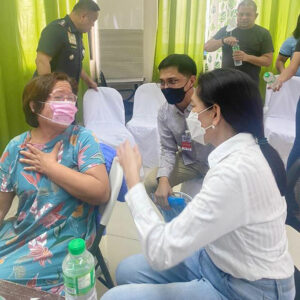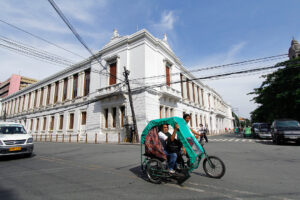Will the persecution of Leila de Lima continue under President Marcos?

“I thank you that when you became president, you provided the atmosphere in which the Court had the freedom to acquit me of the trumped-up charges of my successor and your predecessor, so that the Court voted 11-4 in my favor, including half of those who were appointed by my successor.” This was what former president Gloria Arroyo said to President Rodrigo Duterte during her speech at an appreciation dinner tendered by her colleagues in the House of Representatives on July 9, 2019. Arroyo’s term as Speaker of the House expired nine days before.
In effect, she admitted publicly and formally that the Supreme Court of the Philippines acted on the basis of President Duterte’s direction or wish. To counter the impact of the startling revelation on the image not only of the Supreme Court but of the entire judiciary, Supreme Court Public Information Chief and Spokesperson Atty. Brian Keith Hosaka immediately gave the assurance that no one can tell the Supreme Court how to handle or decide on a case. He declared: “The public can be assured that the Supreme Court has and will always act independently, and free from influence from the other branches of government. The Supreme Court is guided by the rule of law and its decision are always based on facts, laws, and reason.”
It was all for naught. That Hosaka had to give the assurance only confirmed what Arroyo meant when she said, “You (addressing Duterte) provided the atmosphere in which the Court had the freedom to acquit me.” It was obviously a slip of the tongue born of extreme feeling of gratitude.
It will be recalled that in July 2012, Ombudsman Conchita Carpio Morales filed a plunder suit against Arroyo for the alleged misuse of P366 million in Philippine Charity Sweepstakes Office (PCSO) funds from 2008 to 2010. During his campaign for president in 2016, Duterte said there were grounds for Arroyo’s acquittal. He also said repeatedly he “owed” much to her as she had contributed to his campaign funds.
In the very first month of Duterte’s presidency, the Supreme Court, voting 11-4, dismissed the plunder charge against Arroyo for insufficiency of evidence. Eight of the justices who voted to acquit Arroyo were appointed to the Supreme Court by Arroyo herself when she was president. Three were appointees of President Benigno Aquino III or half of the six Aquino appointees to the Supreme Court, not half of those who voted to acquit her. One of them was Duterte’s classmate in San Beda Law. He swore in Duterte as president.
Morales said the Supreme Court decision granting the demurrer to evidence filed by Arroyo was unfortunate. The same petition was denied by the Sandiganbayan. “We were able to present strong evidence consisting of more than 630 documentary exhibits, the testimony of so many witnesses which are reflected in 43 transcripts of stenographic notes, as well as the records of the case from A to Z consisting of more than 40 folders and/or records of the case. So to us, these are exhaustive records which reflect that the prosecution was able to prove the guilt beyond reasonable doubt of the accused,” she stressed.
In contrast to the profuse expression of gratitude of Gloria Arroyo for her release from hospital arrest was the outburst of bitterness and anger of former Senator Leila de Lima over her continued detention and deprivation of basic amenities. Last June, she blasted Secretary of Justice Menardo Guevara for continuing to prosecute her despite three key witnesses retracting their statements that led to her arrest. Said she, “Up to the end of his term, Secretary Guevarra is minded to stand by the lies and manufactured evidence of the Duterte government, not wanting to displease his principal. He is, after all, Duterte’s alter ego. Never mind justice. Never mind fair play. Never mind that an innocent person was kept in jail for the past five years, and counting, without real evidence except the lies of mostly convicted felons.”
De Lima was implicated in the illegal drugs trade inside the New Bilibid Prison when she was Justice Secretary of President Benigno Aquino. She denied vehemently the allegations, accusing Duterte of vendetta. “The truth will come out and I will achieve justice. I am innocent. They will not be able to silence me and stop me from fighting for the truth and justice and against the daily killings and repression by the Duterte regime,” she told reporters shortly before law enforcers arrested her in February 2017.
De Lima’s defense attorney Dino de Leon claimed the prosecutors manufactured cases against his client using coerced testimony from felons with “an axe to grind.” He said that in 2014, De Lima, then Secretary of Justice, raided the country’s maximum-security prison, dismantling the luxurious accommodations of jailed drug lords.
Shortly after her election as senator in 2016 and upon her election by her fellow senators as chairperson of the Senate’s Justice Committee, she initiated the investigation into the bloody war on drugs in Davao City waged by Duterte, then mayor of Davao City.
The opposition, civil society, and human rights groups have been demanding her release from detention, saying that she is a victim of political persecution for being a bitter critic of Duterte’s brutal anti-drug campaign. The demand for her release became louder when the Parliament of the European Union, the United States Congress, Australian Parliament, ASEAN Parliamentarians for Human Rights, Inter-Parliamentary Union, Amnesty International, Human Rights Watch, and Liberal International joined the call on the Government of the Philippines to drop all charges against De Lima.
In the view of the lawmakers of the Western world — where many of our own laws had their origin — and the militant advocates of human rights, De Lima is the object of revenge, her continuous detention, deprivations, and psychological torment the consequence of the vengeance.
Amid calls for President Ferdinand Marcos, Jr. to order prosecutors to drop the drug charges against former senator Leila de Lima, he has stood firm on not interfering with the case. “I think urging prosecutors to do one thing or another is interfering,” he told reporters on Oct. 14. He had previously said, “I think the process is there. We are continuing to monitor what is going on.”
But a number of prominent lawyers have posted on social media their opinion that President Marcos can intervene in the government’s cases against de Lima without interfering with the courts hearing the charges against her. They say the prosecution of criminal charges is a function of the Department of Justice which belongs to the executive branch of government, unlike the adjudication of cases, which belongs to the judiciary as the judiciary is a separate and independent branch of government and outside the control and supervision of the president pursuant to the Constitution.
That makes me wonder if President Marcos is refraining from interfering in the prosecution of the case against Leila de Lima or he is refraining from interfering in Rodrigo Duterte’s persecution of her.
Oscar P. Lagman, Jr. is a retired corporate executive, business consultant, and management professor. He has been a politicized citizen since his college days in the late 1950s.




